THE CALL OF THE SAMAÚMA
Hurricanes, McCain's election craziness, near war in the Middle East and, now, news that deforestation has risen 70% in the Amazon, and still more coming.
It's time to hear the call of the great Samaúma.
Yep, there sure is a lot to pray about in this crazy world. So many innocent ones are calling out. Please try to hear the Samaúma standing firm amongst them.
The video, by Amazon Region Protected Areas (ARPA) Program features an Indian boy using the Samaúma tree to make a call for the Amazon preservation.
In the Amazon, the Samaúma tree (Ceiba pentandra) is distinguished for its majestic size - growing up to 30 meters tall and 6 meters wide. Legend has it that the Samaúma is the home of Curupira, a boy-like supernatural being which protects the forest and the life it supports. The indigenous peoples (and the Curupira himself) use the Samauma tree's immense roots - the sapopemasto - to communicate, drumming on it messages that are sent through the forest.
Here's our special Samaúma at Vila Fortaleza. We're trying to develop a better way -- more respectful and sustainable -- for folks to live with the forest and its beings. Please keep us in your thoughts.
Thanks.
Sunday, August 31, 2008
Friday, August 29, 2008
OBAMA'S SPEECH
I watched the speech on the Internet here in Brasilia. To be honest, I had concerns about the apparent closeness in the various tracking polls that placed Obama and McCain neck-and-neck. Like many, I had begun to wonder if this might be more change than the US electorate was willing to admit.
Earlier in the day I had read in Tim Egan's NY Times blog that, "The most frequent thing I heard in the suburbs of Colorado recently was a simple question: Who is this guy?" In a flash of insight, Egan summed up the challenge facing Obama not as to whether he might convince the viewing audience that he was a regular guy like them, but "What people will remember is whether the stranger in the stadium sounded like someone who could lead them to a better day."
[Update: You can link to a higher resolution HD version of the video HERE]
[Update #2: Nielsen Media Research reports more US viewers watched Obama speak than watched the Olympics opening ceremony in Beijing, the final "American Idol" or the Academy Awards this year.]
So, how did he do?
By now, the day after, there are thousands of answers posted on the Internet. I liked the view offered by Andrew Sullivan at The Daily Dish:
It was a deeply substantive speech, full of policy detail, full of people other than the candidate, centered overwhelmingly on domestic economic anxiety. It was a liberal speech, more unabashedly, unashamedly liberal than any Democratic acceptance speech since the great era of American liberalism. But it made the case for that liberalism - in the context of the decline of the American dream, and the rise of cynicism and the collapse of cultural unity. His ability to portray that liberalism as a patriotic, unifying, ennobling tradition makes him the most lethal and remarkable Democratic figure since John F Kennedy.
What he didn't do was give an airy, abstract, dreamy confection of rhetoric. The McCain campaign set Obama up as a celebrity airhead, a Paris Hilton of wealth and elitism. And he let them portray him that way, and let them over-reach, and let them punch him again and again ... and then he turned around and destroyed them. If the Rove Republicans thought they were playing with a patsy, they just got a reality check.
He took every assault on him and turned them around. He showed not just that he understood the experience of many middle class Americans, but that he understood how the Republicans have succeeded in smearing him. And he didn't shrink from the personal charges; he rebutted them. Whoever else this was, it was not Adlai Stevenson. It was not Jimmy Carter. And it was less afraid and less calculating than Bill Clinton.
Above all, he took on national security - face on, full-throttle, enraged, as we should all be, at how disastrously American power has been handled these past eight years. He owned this issue in a way that no Democrat has owned it since Kennedy. That's a transformative event. To my mind, it is vital that both parties get to own the war on Jihadist terror and that we escape this awful Rove-Morris trap that poisons the discourse into narrow and petty partisan abuse of patriotism. Obama did this tonight. We are in his debt.
Look: I'm biased at this point. I'm one of those people, deeply distressed at what has happened to America, deeply ashamed of my own misjudgments, who has shifted out of my ideological comfort zone because this man seems different to me, and this moment in history seems different to me. I'm not sure we have many more chances to get off the addiction to foreign oil, to prevent a calamitous terrorist attack, to restore constitutional balance in the hurricane of a terror war.
I've said it before - months and months ago. I should say it again tonight. This is a remarkable man at a vital moment. America would be crazy to throw this opportunity away. America must not throw this opportunity away.
Know hope.
Obama ended his speech by invoking the memory of Martin Luther King's "I Have a Dream" speech in Washington 45 years ago:
The men and women who gathered there could've heard many things. They could've heard words of anger and discord. They could've been told to succumb to the fear and frustration of so many dreams deferred.
But what the people heard instead - people of every creed and color, from every walk of life - is that in America, our destiny is inextricably linked. That together, our dreams can be one.
"We cannot walk alone," the preacher cried. "And as we walk, we must make the pledge that we shall always march ahead. We cannot turn back."
Barack Obama's mission is more than the realization of the dream of equal opportunity. It is a giant step toward transforming the dream of individual achievement into the realization of a destiny -- beyond any political ideology -- that builds a new WE for the 21st Century.
I watched the speech on the Internet here in Brasilia. To be honest, I had concerns about the apparent closeness in the various tracking polls that placed Obama and McCain neck-and-neck. Like many, I had begun to wonder if this might be more change than the US electorate was willing to admit.
Earlier in the day I had read in Tim Egan's NY Times blog that, "The most frequent thing I heard in the suburbs of Colorado recently was a simple question: Who is this guy?" In a flash of insight, Egan summed up the challenge facing Obama not as to whether he might convince the viewing audience that he was a regular guy like them, but "What people will remember is whether the stranger in the stadium sounded like someone who could lead them to a better day."
[Update: You can link to a higher resolution HD version of the video HERE]
[Update #2: Nielsen Media Research reports more US viewers watched Obama speak than watched the Olympics opening ceremony in Beijing, the final "American Idol" or the Academy Awards this year.]
So, how did he do?
By now, the day after, there are thousands of answers posted on the Internet. I liked the view offered by Andrew Sullivan at The Daily Dish:
It was a deeply substantive speech, full of policy detail, full of people other than the candidate, centered overwhelmingly on domestic economic anxiety. It was a liberal speech, more unabashedly, unashamedly liberal than any Democratic acceptance speech since the great era of American liberalism. But it made the case for that liberalism - in the context of the decline of the American dream, and the rise of cynicism and the collapse of cultural unity. His ability to portray that liberalism as a patriotic, unifying, ennobling tradition makes him the most lethal and remarkable Democratic figure since John F Kennedy.
What he didn't do was give an airy, abstract, dreamy confection of rhetoric. The McCain campaign set Obama up as a celebrity airhead, a Paris Hilton of wealth and elitism. And he let them portray him that way, and let them over-reach, and let them punch him again and again ... and then he turned around and destroyed them. If the Rove Republicans thought they were playing with a patsy, they just got a reality check.
He took every assault on him and turned them around. He showed not just that he understood the experience of many middle class Americans, but that he understood how the Republicans have succeeded in smearing him. And he didn't shrink from the personal charges; he rebutted them. Whoever else this was, it was not Adlai Stevenson. It was not Jimmy Carter. And it was less afraid and less calculating than Bill Clinton.
Above all, he took on national security - face on, full-throttle, enraged, as we should all be, at how disastrously American power has been handled these past eight years. He owned this issue in a way that no Democrat has owned it since Kennedy. That's a transformative event. To my mind, it is vital that both parties get to own the war on Jihadist terror and that we escape this awful Rove-Morris trap that poisons the discourse into narrow and petty partisan abuse of patriotism. Obama did this tonight. We are in his debt.
Look: I'm biased at this point. I'm one of those people, deeply distressed at what has happened to America, deeply ashamed of my own misjudgments, who has shifted out of my ideological comfort zone because this man seems different to me, and this moment in history seems different to me. I'm not sure we have many more chances to get off the addiction to foreign oil, to prevent a calamitous terrorist attack, to restore constitutional balance in the hurricane of a terror war.
I've said it before - months and months ago. I should say it again tonight. This is a remarkable man at a vital moment. America would be crazy to throw this opportunity away. America must not throw this opportunity away.
Know hope.
Obama ended his speech by invoking the memory of Martin Luther King's "I Have a Dream" speech in Washington 45 years ago:
The men and women who gathered there could've heard many things. They could've heard words of anger and discord. They could've been told to succumb to the fear and frustration of so many dreams deferred.
But what the people heard instead - people of every creed and color, from every walk of life - is that in America, our destiny is inextricably linked. That together, our dreams can be one.
"We cannot walk alone," the preacher cried. "And as we walk, we must make the pledge that we shall always march ahead. We cannot turn back."
Barack Obama's mission is more than the realization of the dream of equal opportunity. It is a giant step toward transforming the dream of individual achievement into the realization of a destiny -- beyond any political ideology -- that builds a new WE for the 21st Century.
Thursday, August 21, 2008
GILBERTO GIL:
Brazil's Revolutionary
Cultural Wedge
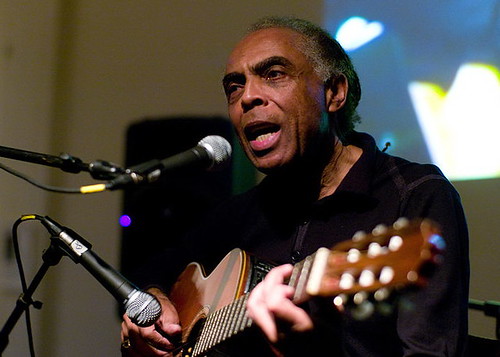
Photo by Joi Ito
Gilberto Gil recently resigned as Brazil's Minister of Culture in order to return full time to his music. Jose Murilo has written a muito legal (very cool) homage to this tropicalist voice for an open digital culture
We previously reported Juarez Duarte Bomfim's amazing story of Gilberto Gil's early connection with Santo Daime and the recent petition to have ayahuasca recognized as part of the cultural heritage of Brazil. Here are two videos -- posted on youtube in Portuguese by the Acre blogger Altino Machado -- of Minister Gil receiving the petition at Alto Santo in Rio Branco here and here.
Jose Murilo sums up the nearly six year term of Gilberto Gil:
"For those of us who worked with him, the loss is big. For him, I think it will be great to feel free again to dedicate himself to music. And one thing is for sure: Gilberto Gil’s tropicalist term has transformed the Brazilian Ministry of Culture.
The tones and rhythms of his leadership will live on."
Brazil's Revolutionary
Cultural Wedge

Photo by Joi Ito
Gilberto Gil recently resigned as Brazil's Minister of Culture in order to return full time to his music. Jose Murilo has written a muito legal (very cool) homage to this tropicalist voice for an open digital culture
We previously reported Juarez Duarte Bomfim's amazing story of Gilberto Gil's early connection with Santo Daime and the recent petition to have ayahuasca recognized as part of the cultural heritage of Brazil. Here are two videos -- posted on youtube in Portuguese by the Acre blogger Altino Machado -- of Minister Gil receiving the petition at Alto Santo in Rio Branco here and here.
Jose Murilo sums up the nearly six year term of Gilberto Gil:
"For those of us who worked with him, the loss is big. For him, I think it will be great to feel free again to dedicate himself to music. And one thing is for sure: Gilberto Gil’s tropicalist term has transformed the Brazilian Ministry of Culture.
The tones and rhythms of his leadership will live on."
The (new) WILD WILD WEST
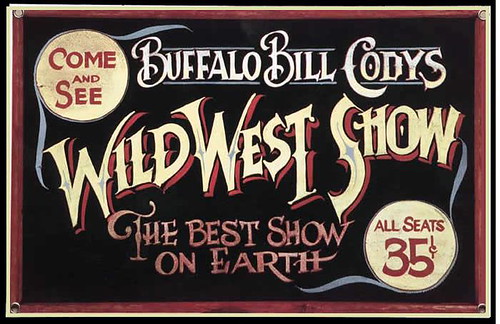
While I was doing environmental politics in the US northwest, Timothy Egan was the western editor for the NY Times. I always found his journalism as sensibly enlightened and his political analysis uniquely penetrating. If you are interested in the "new western politics" of the US, his blog is among the very best I have seen. Here is his view of Obama.
Go to Original
August 20, 2008, 7:30 pm
Mile-High Makeover
by Timothy Egan
DENVER -– From Buffalo Bill’s grave atop Lookout Mountain you can see nearly every vote Barack Obama needs to win the presidency -– that is, if all goes as planned starting next week, when Democrats settle into the Geography of Hope.
Below are the Front Range suburbs, one of the fastest growing areas in the country, where women and the young are more likely to favor Obama, and men are proudly independent -– waiting to be impressed, reluctant to embrace any one party, concerned about the rookie with the funny name.
You see a metro area rated one of the most educated, but also a troubled exurban frontier, mile-high neighborhoods named for lost ranches where the leading crop this season is the foreclosure sign.
This is the America that Obama has to win, and if he simply holds on to every state that Al Gore took in 2000 and claims Colorado’s nine electoral votes he will be the next president.
This is also the America that Karl Rove lost, or miscalculated, when the man who likes to be called The Architect thought he had put together his permanent Republican majority. It was based on an all-white core in the solid South, evangelicals and small towns in the Midwest, and gun lovers and tax-aphobics in the Mountain West.
But politics is not all wedge issues and brand-specific sloganeering. At some point, parties have to govern. And what nearly two-out-of-every-three Americans concluded in the last four years -– based on disapproval ratings -– was that Republicans could not govern at a national level.
They lost a city, in New Orleans, a budget surplus by pandering to lobbyist-greased congressional leaders, and world standing by waging a war that may end up as the most costly and longest in our history.
Their moral strutting proved as thin as the claim to fiscal responsibility. Down the road, in Colorado Springs, a minister who bragged that he had the White House on speed dial was brought down by a male prostitute and meth.
Western Democrats, so long in the desert, have reinvented themselves. What people will see on television early next week will be feisty, independent-minded governors from Montana, Arizona and Colorado, and a Latino senator, Ken Salazar, who can wear a cowboy hat without looking like John Kerry in camouflage.
In 2004, Republicans had a 175,000-person advantage in party identification among registered voters in Colorado. That’s been cut in half. And this year, among new voters, the tide is blue, with 69,000 registering as Democrats against only 42,000 as Republicans.
The Architect now thinks Obama will likely win Colorado, as he said in a Wall Street Journal piece last week. The key to an Obama victory here would be college-educated white voters, according to Rove. The Dilberts in all these office parks with mountain bike tracks just outside are trending Democratic.
And something else is at work: the Census Bureau earlier this month predicted that by the year 2023 -– yes, a mere 15 years away -– more than half of all children in the United States will be minorities. Hispanics make up the bulk of that change, and as they come of age, they follow people like Salazar, who won the big suburban counties in the Denver metro area even as John Kerry lost them in 2004.
These Mountain Democrats have given national Democrats a way to win the West — and by extension the White House. They need a clear energy policy, not just pictures of windmills and happy talk by Prius-driving enviros. John McCain is winning the energy debate with a simplistic and untrue promise to drill our way to lower gas prices — the opposite of straight talk, but it’s working. A Rocky Mountain News poll last week showed that Colorado voters who listed energy and gas prices as the top issue favored McCain 50 percent to 34 percent.
Democrats will need to speak to middle-class financial insecurity. That same Rocky Mountain poll showed that the economy is the number one issue, and among those voters Obama had the edge, 44 to 38 percent.
That poll also gave Obama the edge among suburban women, and therein lies the third secret to winning here. In stating imperiously last week that life begins at conception, McCain showed that he is out of touch with the prevailing sentiment of New Westerners. On guns, abortion, and other issues of personal choice, they want government to leave them alone. They are independents, an affiliation growing faster than Republicans, who resemble Cafeteria Catholics. That is, they pick and choose what they like from each of the parties.
McCain’s cock-eyed certainty -– on a woman’s choice, as well as war -– sounds more like that of George W. Bush, who has become toxic in this state, despite having won it twice.
Finally, the war is as unpopular here as it is elsewhere. But the issue that hasn’t been hammered home, yet comes up repeatedly in interviews with voters, is one of old-fashioned national interest. Why spend $10 billion a month rebuilding a country that has an oil revenue surplus, while here at home we max out our credit cards to pay the weekly gas bill?
It’s a selfish but old-fashioned argument: those ungrateful Iraqis are draining our treasury, and for what? McCain, despite his senior moments and the reflexive go-to-war sentiments he showed last week on Georgia and Russia, is trusted more on foreign affairs. But if he can be painted as the guy behind the ultimate earmark — a blank check to Iraq — the war becomes his Bridge to Nowhere.
Between rallies and parties next week, Democrats would do well to come up to the Rocky Mountain promontory where William F. Cody, the Elvis of the Old West, is buried. They should come to this perch and look out at the future. It’s theirs to lose.

While I was doing environmental politics in the US northwest, Timothy Egan was the western editor for the NY Times. I always found his journalism as sensibly enlightened and his political analysis uniquely penetrating. If you are interested in the "new western politics" of the US, his blog is among the very best I have seen. Here is his view of Obama.
Go to Original
August 20, 2008, 7:30 pm
Mile-High Makeover
by Timothy Egan
DENVER -– From Buffalo Bill’s grave atop Lookout Mountain you can see nearly every vote Barack Obama needs to win the presidency -– that is, if all goes as planned starting next week, when Democrats settle into the Geography of Hope.
Below are the Front Range suburbs, one of the fastest growing areas in the country, where women and the young are more likely to favor Obama, and men are proudly independent -– waiting to be impressed, reluctant to embrace any one party, concerned about the rookie with the funny name.
You see a metro area rated one of the most educated, but also a troubled exurban frontier, mile-high neighborhoods named for lost ranches where the leading crop this season is the foreclosure sign.
This is the America that Obama has to win, and if he simply holds on to every state that Al Gore took in 2000 and claims Colorado’s nine electoral votes he will be the next president.
This is also the America that Karl Rove lost, or miscalculated, when the man who likes to be called The Architect thought he had put together his permanent Republican majority. It was based on an all-white core in the solid South, evangelicals and small towns in the Midwest, and gun lovers and tax-aphobics in the Mountain West.
But politics is not all wedge issues and brand-specific sloganeering. At some point, parties have to govern. And what nearly two-out-of-every-three Americans concluded in the last four years -– based on disapproval ratings -– was that Republicans could not govern at a national level.
They lost a city, in New Orleans, a budget surplus by pandering to lobbyist-greased congressional leaders, and world standing by waging a war that may end up as the most costly and longest in our history.
Their moral strutting proved as thin as the claim to fiscal responsibility. Down the road, in Colorado Springs, a minister who bragged that he had the White House on speed dial was brought down by a male prostitute and meth.
Western Democrats, so long in the desert, have reinvented themselves. What people will see on television early next week will be feisty, independent-minded governors from Montana, Arizona and Colorado, and a Latino senator, Ken Salazar, who can wear a cowboy hat without looking like John Kerry in camouflage.
In 2004, Republicans had a 175,000-person advantage in party identification among registered voters in Colorado. That’s been cut in half. And this year, among new voters, the tide is blue, with 69,000 registering as Democrats against only 42,000 as Republicans.
The Architect now thinks Obama will likely win Colorado, as he said in a Wall Street Journal piece last week. The key to an Obama victory here would be college-educated white voters, according to Rove. The Dilberts in all these office parks with mountain bike tracks just outside are trending Democratic.
And something else is at work: the Census Bureau earlier this month predicted that by the year 2023 -– yes, a mere 15 years away -– more than half of all children in the United States will be minorities. Hispanics make up the bulk of that change, and as they come of age, they follow people like Salazar, who won the big suburban counties in the Denver metro area even as John Kerry lost them in 2004.
These Mountain Democrats have given national Democrats a way to win the West — and by extension the White House. They need a clear energy policy, not just pictures of windmills and happy talk by Prius-driving enviros. John McCain is winning the energy debate with a simplistic and untrue promise to drill our way to lower gas prices — the opposite of straight talk, but it’s working. A Rocky Mountain News poll last week showed that Colorado voters who listed energy and gas prices as the top issue favored McCain 50 percent to 34 percent.
Democrats will need to speak to middle-class financial insecurity. That same Rocky Mountain poll showed that the economy is the number one issue, and among those voters Obama had the edge, 44 to 38 percent.
That poll also gave Obama the edge among suburban women, and therein lies the third secret to winning here. In stating imperiously last week that life begins at conception, McCain showed that he is out of touch with the prevailing sentiment of New Westerners. On guns, abortion, and other issues of personal choice, they want government to leave them alone. They are independents, an affiliation growing faster than Republicans, who resemble Cafeteria Catholics. That is, they pick and choose what they like from each of the parties.
McCain’s cock-eyed certainty -– on a woman’s choice, as well as war -– sounds more like that of George W. Bush, who has become toxic in this state, despite having won it twice.
Finally, the war is as unpopular here as it is elsewhere. But the issue that hasn’t been hammered home, yet comes up repeatedly in interviews with voters, is one of old-fashioned national interest. Why spend $10 billion a month rebuilding a country that has an oil revenue surplus, while here at home we max out our credit cards to pay the weekly gas bill?
It’s a selfish but old-fashioned argument: those ungrateful Iraqis are draining our treasury, and for what? McCain, despite his senior moments and the reflexive go-to-war sentiments he showed last week on Georgia and Russia, is trusted more on foreign affairs. But if he can be painted as the guy behind the ultimate earmark — a blank check to Iraq — the war becomes his Bridge to Nowhere.
Between rallies and parties next week, Democrats would do well to come up to the Rocky Mountain promontory where William F. Cody, the Elvis of the Old West, is buried. They should come to this perch and look out at the future. It’s theirs to lose.
Friday, August 15, 2008
Santo Daime Reunion:
Family, Birthdays and Joy at Ceu de Fátima
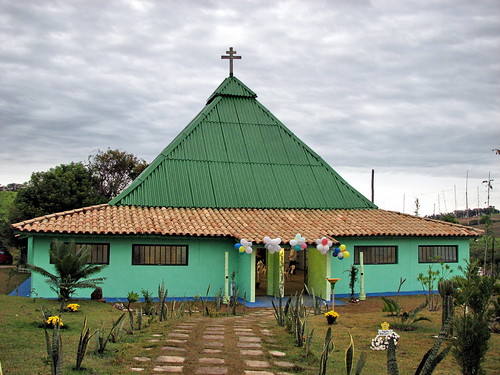
I traveled last week, back to the São Paulo area, in order to join up with the Luíz Mendes family who were returning from Canada, and to celebrate several birthdays at the Santo Daime church in Araçoiaba da Serra.
The 8th of August was both the anniversary of the church and the birthday of Madrinha Rizelda. The day began at the flower market
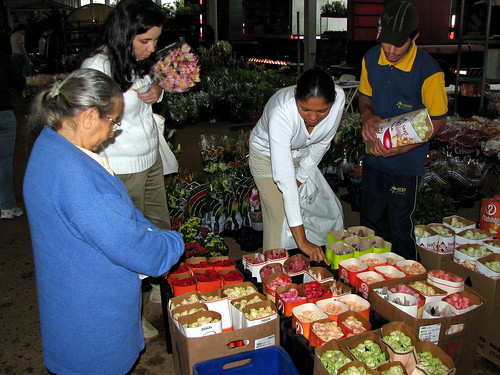
making selections for the festive decorations of the church
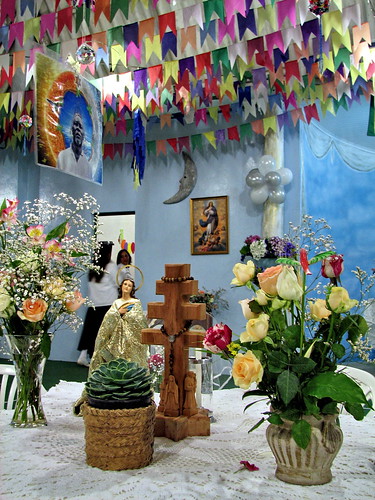
The spiritual work was opened by Mad Fatima and Pad Sidney
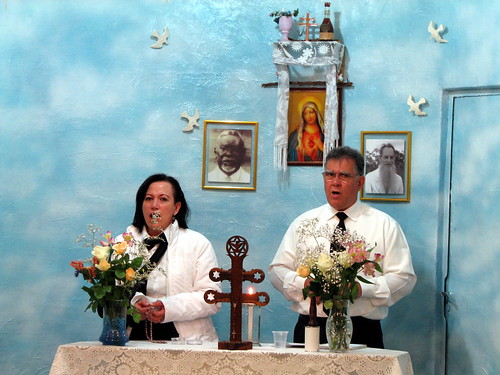
and Pad Luíz
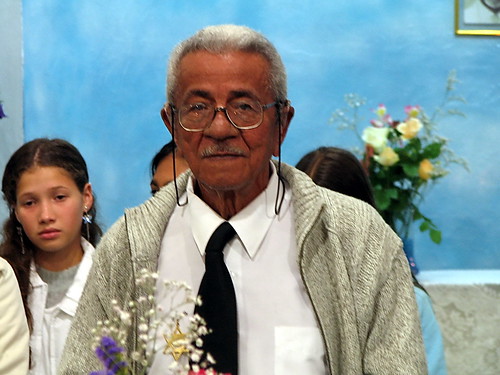
We started with the singing of the hinario of João Pereira led by Saturnino who is the caretaker of this collection of hymns
and continued into the interval with the Entertainments of the Master
Next we sang the hinario of Saturnino. Here's the hymn "We Are All Equal" which has become an anthem of friendship
The party continued after the spiritual work with cakes and birthday festivities
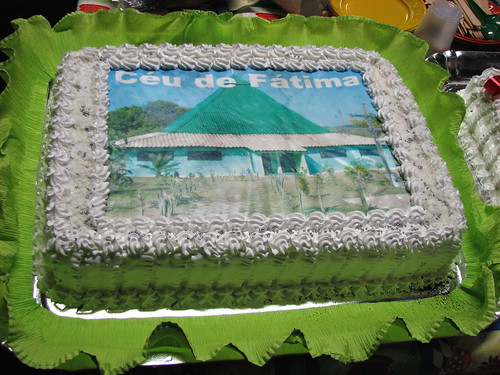
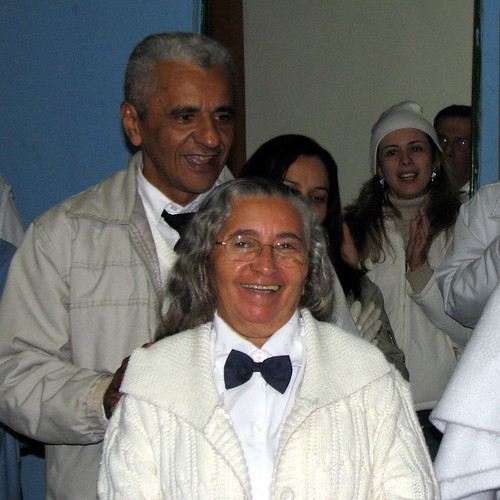
Then came the Forró with Pad Luíz and Mad Rizelda really giving us a show of how it's done
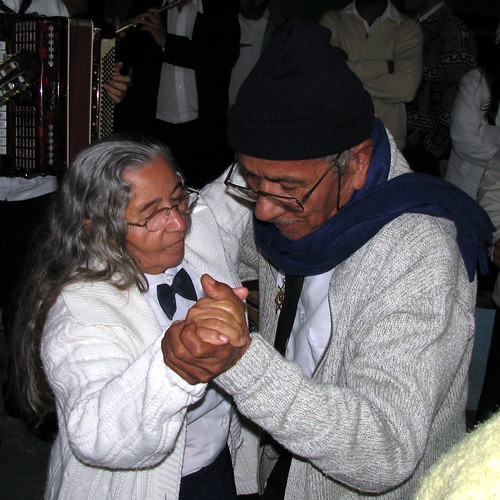
As dawn arrived Padrinho Luíz, who is famous in the Santo Daime movement as a storyteller, was "telling a good one" to Alessandra. Here's a little sequence that "has the flavor."
When the comitiva traveled back to Acre State and Vila Fortaleza, I stayed on in the home of Mad Fatima and Pad Sidney to visit some more with the extended family and also to attend the clinic, where both Pad Sidney and his daughter Alessandra are doctors, in order to complete my very thorough 70th year medical check-up.

(I'm happy to report that things are looking good. I'm grateful.)
At the end of my marvelous week of visits there came another grand party, this time for the birthday of Mad. Fatima.
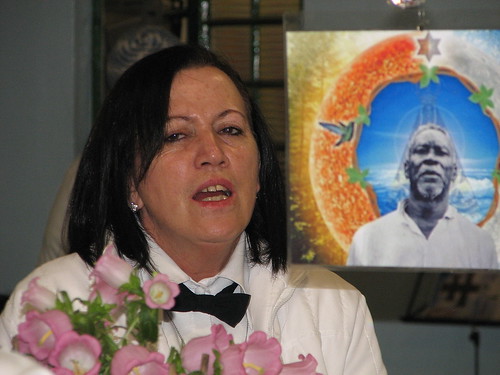
The festivities began with the singing of the hinario of Antônio Gomez (the great grandfather of Saturnino's wife Lusirene). Here is the hymn A Rainha da Floresta (The Queen of the Forest)
and then parabéns and vivas for Madrinha
and the singing of "this is the house of our festivals"
and, of course, another cake
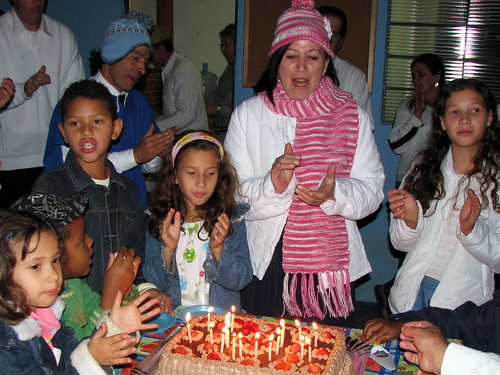
Yes, the Santo Daime is the house of our festivals and it's always a great to share the joys of this incredible family. At the first spiritual work of this festival I took a picture of a very expectant Ana Paula
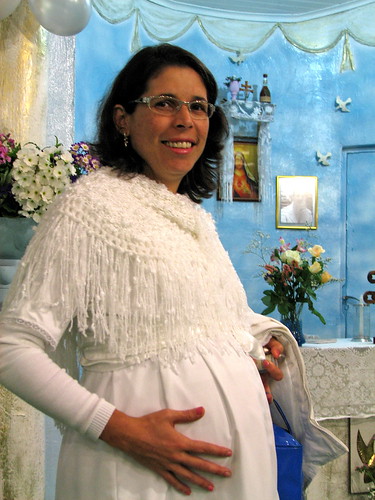
and now we get to welcome the newest addition to the family of Juramidam. Bem-vindo Miguel!
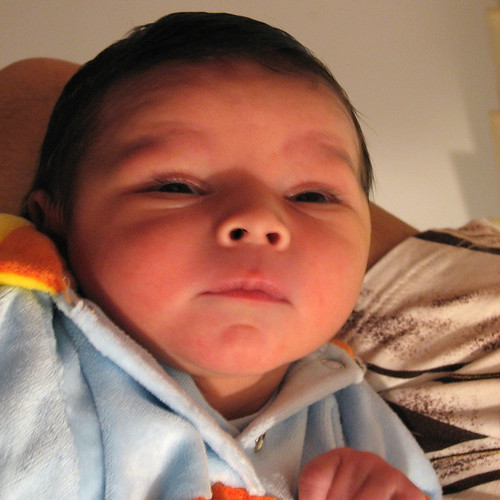


VIVA MIGUEL!
VIVA MIGUEL!
VIVA MIGUEL!
See all the photos from February HERE
See all the photos from August HERE
See all the Miguel photos HERE
Family, Birthdays and Joy at Ceu de Fátima

I traveled last week, back to the São Paulo area, in order to join up with the Luíz Mendes family who were returning from Canada, and to celebrate several birthdays at the Santo Daime church in Araçoiaba da Serra.
The 8th of August was both the anniversary of the church and the birthday of Madrinha Rizelda. The day began at the flower market

making selections for the festive decorations of the church

The spiritual work was opened by Mad Fatima and Pad Sidney

and Pad Luíz

We started with the singing of the hinario of João Pereira led by Saturnino who is the caretaker of this collection of hymns
and continued into the interval with the Entertainments of the Master
Next we sang the hinario of Saturnino. Here's the hymn "We Are All Equal" which has become an anthem of friendship
The party continued after the spiritual work with cakes and birthday festivities


Then came the Forró with Pad Luíz and Mad Rizelda really giving us a show of how it's done

As dawn arrived Padrinho Luíz, who is famous in the Santo Daime movement as a storyteller, was "telling a good one" to Alessandra. Here's a little sequence that "has the flavor."
When the comitiva traveled back to Acre State and Vila Fortaleza, I stayed on in the home of Mad Fatima and Pad Sidney to visit some more with the extended family and also to attend the clinic, where both Pad Sidney and his daughter Alessandra are doctors, in order to complete my very thorough 70th year medical check-up.

(I'm happy to report that things are looking good. I'm grateful.)
At the end of my marvelous week of visits there came another grand party, this time for the birthday of Mad. Fatima.

The festivities began with the singing of the hinario of Antônio Gomez (the great grandfather of Saturnino's wife Lusirene). Here is the hymn A Rainha da Floresta (The Queen of the Forest)
and then parabéns and vivas for Madrinha
and the singing of "this is the house of our festivals"
and, of course, another cake

Yes, the Santo Daime is the house of our festivals and it's always a great to share the joys of this incredible family. At the first spiritual work of this festival I took a picture of a very expectant Ana Paula

and now we get to welcome the newest addition to the family of Juramidam. Bem-vindo Miguel!



VIVA MIGUEL!
VIVA MIGUEL!
VIVA MIGUEL!
See all the photos from February HERE
See all the photos from August HERE
See all the Miguel photos HERE
Tuesday, August 05, 2008
Authority, Credibility and the Audacity of Change
I just had what seems as an uniquely Internet experience of reading two different essays arriving to my attention from two very different writers -- both named David -- about very different topics only to discover that both seemed to be reflections of each other as they attempted to comment on the ambiguities and uncertainties of leadership roles in the new age of something bigger.
The first essay is from the very insightful and right-of-center New York Times columnist David Brooks who looks at Obama and wonders Where’s the Landslide?
David begins,
"Why isn’t Barack Obama doing better? Why, after all that has happened, does he have only a slim two- or three-point lead over John McCain, according to an average of the recent polls? Why is he basically tied with his opponent when his party is so far ahead?"
He goes on to speculate that Obama is of a new generation -- perhaps of global citizenship -- where leaders are "sojourners" passing through a variety of situations that they act in but somehow are not of. This is both a liberation from the stuckness of already staked-out and rigid positions and a confusion as to where they are coming from.
"This ability to stand apart accounts for his fantastic powers of observation, and his skills as a writer and thinker. It means that people on almost all sides of any issue can see parts of themselves reflected in Obama’s eyes. But it does make him hard to place."
David concludes:
"If Obama is fully a member of any club — and perhaps he isn’t — it is the club of smart post-boomer meritocrats. We now have a cohort of rising leaders, Obama’s age and younger, who climbed quickly through elite schools and now ascend from job to job. They are conscientious and idealistic while also being coldly clever and self-aware. It’s not clear what the rest of America makes of them.
"So, cautiously, the country watches. This should be a Democratic wipeout. But voters seem to be slow to trust a sojourner they cannot place."
My next read was from the equally insightful left-of-center editor of openDemocracy Dave Hayes who pondered his own role as a channeler of information that attempts to go beyond the stuckness of place and position. His full essay, Authority, credibility and openDemocracy is a beautifully written and inspiring essay.
He begins by describing the new task of word-smithing (here change-oriented editors and candidates have something in common):
"The task of meaning-making is an attempt to deliver something to the reader - some combination of words, voices, ideas, images - that does something other than add to its noise or than fuel its angers and troubles.
"Most important of all for openDemocracy, is the world itself in all its complexity: both the uncapturable prolificity of immediate events, and the longer-term trends and dynamics. ... The whole process - commissioning, writing, editing, publication - involves a filtering of the flux in a way that (in principle, and at its best) works to everyone's advantage: produces material that expresses the writer, engages and enlightens the reader, and extends openDemocracy's role as an agent of serious, trustworthy discourse.
"The larger context of this work is for all involved a now-familiar one: the swirling, boundless, techno-rich, always-on, 24/7 media landscape and cyberscape. This is also the world we live inside and that lives inside us. In the context of our particular professional experience and angle of vision, we are all living a "double life" - trying to discover what it means to be "ourselves" amid the constant awareness of the astonishing, ungraspable surplus that is permanently only an eyeball, ear-socket or finger-click away. (The inferno in the background - moronic or intelligent by turns, but in either case relentless - is always there.)
"For openDemocracy, this "double life" can be said to have three aspects. The first (it might be called definition) is that as a small organisation our work's value lies partly in the doing of what other, larger media companies don't or can't do. Part of this entails avoiding the temptation of trying to process the waterfall into formula or using it as a pretext to confirm to ourselves and our readers what we already think we know about it. Part of it entails refusing cynicism, contrarianism, orientalism, Chomskyianism, or other certain routes to intellectual closure and disempowerment. Part of it entails rejecting the imprisoning categories of "mainstream" and "alternative" as descriptions of our own or others' work - both in principle, and because "alternative" orthodoxies can be as conformist as the other kind.
"More positively, this aspect of the "double life" involves respecting the prolific, multi-centred character of the world "out there", and trying from the inside to make sense of as many parts of it as we can...."
At the conclusion of his long and brilliant essay, David says,
"If the world itself in all its complexity is the vital first reference-point for all we do, the answers to the huge questions it poses won't come from either a retreat into dogma or to an imaginary higher ground that holds the difficulty and irreducibility of the world at bay; nor a complete accommodation to the flux that outsources judgment to the remorseless 24/7 cycle. The role of a serious publication and of an editor is to maintain and nurture - but also where necessary to refresh - a consistent character, as part of a constant effort to make meaning and advance understanding. My own editorial guiding light here is a saying of Mahatma Gandhi:
"I want the winds of all the worlds to blow through my house, but I don't want to be blown off my feet".
As a presidential candidate, Obama, faces much greater pressures than an editor of an alternative online publication but as one who is attempting to lead with the power of words this seems like a perfect guiding light for him as well.
I just had what seems as an uniquely Internet experience of reading two different essays arriving to my attention from two very different writers -- both named David -- about very different topics only to discover that both seemed to be reflections of each other as they attempted to comment on the ambiguities and uncertainties of leadership roles in the new age of something bigger.
The first essay is from the very insightful and right-of-center New York Times columnist David Brooks who looks at Obama and wonders Where’s the Landslide?
David begins,
"Why isn’t Barack Obama doing better? Why, after all that has happened, does he have only a slim two- or three-point lead over John McCain, according to an average of the recent polls? Why is he basically tied with his opponent when his party is so far ahead?"
He goes on to speculate that Obama is of a new generation -- perhaps of global citizenship -- where leaders are "sojourners" passing through a variety of situations that they act in but somehow are not of. This is both a liberation from the stuckness of already staked-out and rigid positions and a confusion as to where they are coming from.
"This ability to stand apart accounts for his fantastic powers of observation, and his skills as a writer and thinker. It means that people on almost all sides of any issue can see parts of themselves reflected in Obama’s eyes. But it does make him hard to place."
David concludes:
"If Obama is fully a member of any club — and perhaps he isn’t — it is the club of smart post-boomer meritocrats. We now have a cohort of rising leaders, Obama’s age and younger, who climbed quickly through elite schools and now ascend from job to job. They are conscientious and idealistic while also being coldly clever and self-aware. It’s not clear what the rest of America makes of them.
"So, cautiously, the country watches. This should be a Democratic wipeout. But voters seem to be slow to trust a sojourner they cannot place."
My next read was from the equally insightful left-of-center editor of openDemocracy Dave Hayes who pondered his own role as a channeler of information that attempts to go beyond the stuckness of place and position. His full essay, Authority, credibility and openDemocracy is a beautifully written and inspiring essay.
He begins by describing the new task of word-smithing (here change-oriented editors and candidates have something in common):
"The task of meaning-making is an attempt to deliver something to the reader - some combination of words, voices, ideas, images - that does something other than add to its noise or than fuel its angers and troubles.
"Most important of all for openDemocracy, is the world itself in all its complexity: both the uncapturable prolificity of immediate events, and the longer-term trends and dynamics. ... The whole process - commissioning, writing, editing, publication - involves a filtering of the flux in a way that (in principle, and at its best) works to everyone's advantage: produces material that expresses the writer, engages and enlightens the reader, and extends openDemocracy's role as an agent of serious, trustworthy discourse.
"The larger context of this work is for all involved a now-familiar one: the swirling, boundless, techno-rich, always-on, 24/7 media landscape and cyberscape. This is also the world we live inside and that lives inside us. In the context of our particular professional experience and angle of vision, we are all living a "double life" - trying to discover what it means to be "ourselves" amid the constant awareness of the astonishing, ungraspable surplus that is permanently only an eyeball, ear-socket or finger-click away. (The inferno in the background - moronic or intelligent by turns, but in either case relentless - is always there.)
"For openDemocracy, this "double life" can be said to have three aspects. The first (it might be called definition) is that as a small organisation our work's value lies partly in the doing of what other, larger media companies don't or can't do. Part of this entails avoiding the temptation of trying to process the waterfall into formula or using it as a pretext to confirm to ourselves and our readers what we already think we know about it. Part of it entails refusing cynicism, contrarianism, orientalism, Chomskyianism, or other certain routes to intellectual closure and disempowerment. Part of it entails rejecting the imprisoning categories of "mainstream" and "alternative" as descriptions of our own or others' work - both in principle, and because "alternative" orthodoxies can be as conformist as the other kind.
"More positively, this aspect of the "double life" involves respecting the prolific, multi-centred character of the world "out there", and trying from the inside to make sense of as many parts of it as we can...."
At the conclusion of his long and brilliant essay, David says,
"If the world itself in all its complexity is the vital first reference-point for all we do, the answers to the huge questions it poses won't come from either a retreat into dogma or to an imaginary higher ground that holds the difficulty and irreducibility of the world at bay; nor a complete accommodation to the flux that outsources judgment to the remorseless 24/7 cycle. The role of a serious publication and of an editor is to maintain and nurture - but also where necessary to refresh - a consistent character, as part of a constant effort to make meaning and advance understanding. My own editorial guiding light here is a saying of Mahatma Gandhi:
"I want the winds of all the worlds to blow through my house, but I don't want to be blown off my feet".
As a presidential candidate, Obama, faces much greater pressures than an editor of an alternative online publication but as one who is attempting to lead with the power of words this seems like a perfect guiding light for him as well.
Monday, August 04, 2008
Astral Bridge
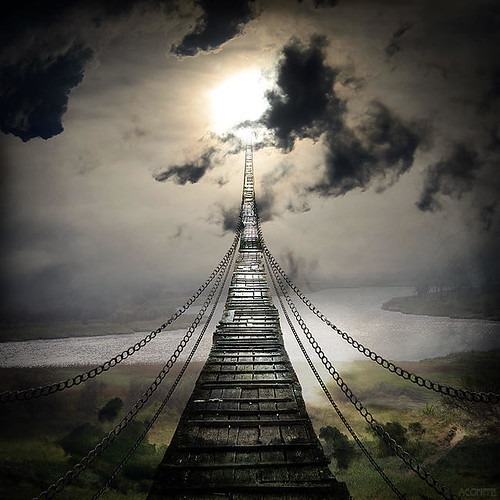
There's a new website reporting the renewed scientific interest and studies of entheogens. Good reporting and great graphics!

There's a new website reporting the renewed scientific interest and studies of entheogens. Good reporting and great graphics!
Saturday, August 02, 2008
Saving the Amazon Forest
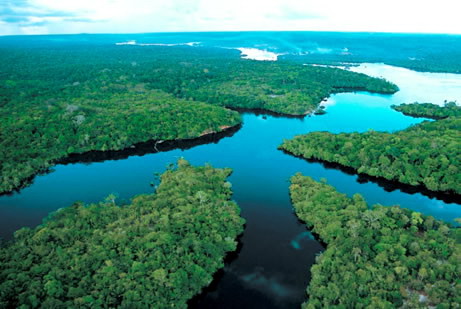
Brazil Establishes Forest Fund
Direct from the treehugger:
In an effort to raise money to prevent deforestation and preserve remaining areas of the Amazon rainforest, Brazil has announced that it has established an international fund for forest protection. Brazilian president Luiz Inacio Lula da Silva has signed a decree establishing The Amazon Fund, which will be able to receive up to US$21 billion over the next 13 years. Donations in the first year will be capped at $1 billion.
Norway the First Nation to Donate
On announcement, the fund is already a tenth of the way towards that first year cap. Norway has pledged to donate $100 million in September. Any money received will not be tax deductible or applicable to any carbon trading scheme.
The fund will be administed by the National Economic and Social Development Banks (BNDES). The bank’s director Eduardo de Mello has said, “Donations are voluntary and donors have no say over the use of the resources.”
Up to 20 percent of funds received can be used to preserve areas of the Brazil’s ecosystem outside of the Amazon region itself.
While I’m hopeful that The Amazon Fund is a step in the right direction of halting increasing rainforest deforestation, only time will tell if Brazil will be able to fully hold on to the environmental gains that these donations may enable.
The challenge of creating a good balance between commodity-and-energy driven development and preserving biodiversity and ecosystem services is not an easy one. An excellent report from Mongabay has assembled an overview of the future threats to the Amazon rainforest in which they look at past, current and potential future drivers of deforestation in the Brazilian Amazon. The future of this gigantic forest -- larger than Western Europe -- and world center of biodiversity will be determined across the next few decades.

Brazil Establishes Forest Fund
Direct from the treehugger:
In an effort to raise money to prevent deforestation and preserve remaining areas of the Amazon rainforest, Brazil has announced that it has established an international fund for forest protection. Brazilian president Luiz Inacio Lula da Silva has signed a decree establishing The Amazon Fund, which will be able to receive up to US$21 billion over the next 13 years. Donations in the first year will be capped at $1 billion.
Norway the First Nation to Donate
On announcement, the fund is already a tenth of the way towards that first year cap. Norway has pledged to donate $100 million in September. Any money received will not be tax deductible or applicable to any carbon trading scheme.
The fund will be administed by the National Economic and Social Development Banks (BNDES). The bank’s director Eduardo de Mello has said, “Donations are voluntary and donors have no say over the use of the resources.”
Up to 20 percent of funds received can be used to preserve areas of the Brazil’s ecosystem outside of the Amazon region itself.
While I’m hopeful that The Amazon Fund is a step in the right direction of halting increasing rainforest deforestation, only time will tell if Brazil will be able to fully hold on to the environmental gains that these donations may enable.
The challenge of creating a good balance between commodity-and-energy driven development and preserving biodiversity and ecosystem services is not an easy one. An excellent report from Mongabay has assembled an overview of the future threats to the Amazon rainforest in which they look at past, current and potential future drivers of deforestation in the Brazilian Amazon. The future of this gigantic forest -- larger than Western Europe -- and world center of biodiversity will be determined across the next few decades.
Subscribe to:
Posts (Atom)





